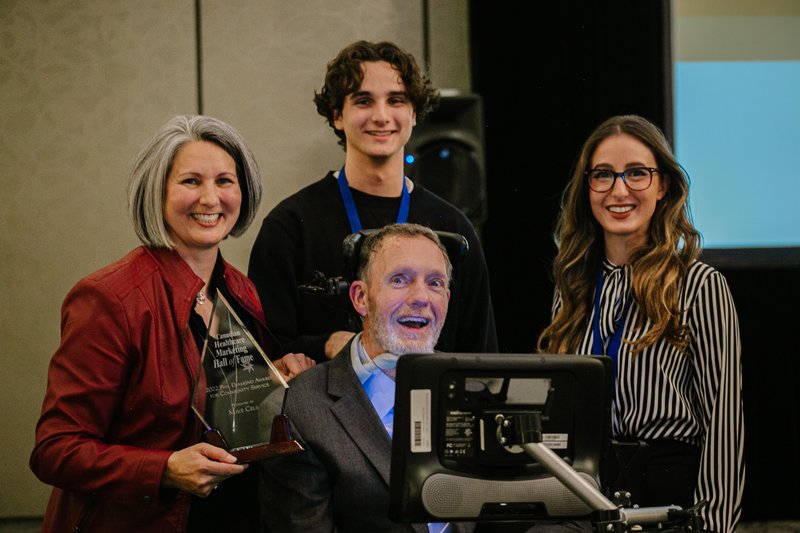
ALS community stories
Each person’s experience with ALS is different and comes with a unique set of challenges that spark inspiration and hope. It is through sharing these experiences that we can help one another.
How early access to multidisciplinary care can improve outcomes for those living with ALS
Early intervention and access to multidisciplinary care improved the quality of life for Mike Cels, who has been living with ALS for over six years.
June 20, 2024

When Mike Cels received news of his ALS diagnosis in 2017, like many others, it took him a while to come to terms with it. “I spent a long time in denial, buried my head in the sand. I didn’t want to accept it. The disease progressed anyway, and I just lost precious time,” Mike explains.
His wife, Carmen Cels, recalls the first few months being the most challenging, between accepting their new reality and being overwhelmed with tests and procedures and planning for Mike’s care. “I went straight into research mode,” she notes, “What does this mean? What are we going to have to plan for?”
Because it takes an average of 21 months to receive an ALS diagnosis in Canada,i by the time Mike was diagnosed, the disease would have already progressed. To ensure that Mike was given the best opportunity to maintain his quality of life for as long as possible, early access to a variety of care was crucial.
Given that ALS affects different parts of the body, those living with the disease will eventually require support with various day-to-day activities such as mobility, speaking, eating, and breathing on their own.ii
For this reason, many ALS clinics in Canada are multidisciplinary – meaning they are staffed with a team of specialists that include neurologists, respirologists, physiatrists, and allied health providers such as nurses, occupational therapists, speech and language pathologists, and dieticians. Each of these healthcare providers has expertise to help people living with ALS at various points throughout the ALS journey.iii
According to Mike, the multidisciplinary care team at his clinic was a tremendous help as his disease progressed.
I have used almost every support possible at one point or another, from occupational therapy, physiotherapy, respiratory therapy, and speech and language support. Accessing it all in one place saved me countless hours and untold discomfort travelling to appointments.
Beyond offering medical support, ALS multidisciplinary care teams understand how difficult the disease is to manage in all aspects of daily life and often go above and beyond to provide support to patients and their caregivers.
“Mike’s occupational therapist has been there every step of the way, and that’s been really important to us. She’s helped us not only by recommending things like a cervical collar to help take the strain off Mike’s neck muscles, but with anything we feel we need,” says Carmen. “She also helped write letters to our insurance company to help us get the coverage that we think we are eligible for. There are a lot of forms that get filled out and details to navigate, so having someone to walk us through some of those things was extremely helpful.”
However, asking for help is not always easy, especially for those who are newly diagnosed and still in the process of coming to terms with their diagnosis. “Mike wanted to wait as long as absolutely necessary before he needed to accept any kind of intervention. For example, he felt he needed to wait as long as possible before using an eye gaze device, even though we were having significant difficulties communicating with him,” Carmen says.
But looking back at it all, Mike and Carmen encourage people who are newly diagnosed with ALS and their caregivers to seek help early. “Based on my own experience, I would encourage new patients and their families to not wait for anything from renovations to travel to anything else,” Mike says.
Resource for patients and caregivers
For those recently diagnosed or living with ALS, there are ALS Clinics across Canada that provide personalized multidisciplinary care.
- To find an ALS Clinic in Ontario, visit ca/support-services/inside-of-ontario/als-clinics/
- To find an ALS Clinic outside of Ontario, visit ca/support-services/other-provinces/
Resource for healthcare providers
Did you know that you do not need confirmation of an ALS diagnosis to refer persons to an ALS Clinic?
The ALS Society of Canada’s ReferALS program is designed to help healthcare providers recognize and understand the signs and symptoms of ALS, as well as how and when to refer suspected ALS cases to a specialty Canadian ALS Research Network (CALS) Clinic.
The program aims to reduce the time to diagnosis of ALS across Canada, expediting critical access to multidisciplinary care, approved treatments, and clinical trials which may slow disease progression and/or improve quality of life.iv
To learn more about the ReferALS program and the Early Referral Tool, visit als.ca/what-is-als/resources/referals/
Unfortunately, following the publication of this article, Mike Cels passed away on July 18, 2025, as a result of his ALS.
i Richards D, Morren JA, Pioro EP. Time to diagnosis and factors affecting diagnostic delay in amyotrophic lateral sclerosis. J Neurol Sci. 2020;417:117054. https://doi.org/10.1016/j.jns.2020.117054.
ii ALS Pathways. Canada: ALS Overview; c2023. Accessed on April 25, 2024. How Does ALS Affect the Body? Available from: https://www.alspathways.ca/als-overview/
iii ALS Pathways. Canada: Resources For You; c2023. Accessed on April 25, 2024. ALS Clinics. Available from: https://www.alspathways.ca/als-resources/
iv ALS Society of Canada. Canada: What is ALS; c2023. Accessed on April 25, 2024. Resources. Referrals. Available from: https://als.ca/what-is-als/resources/referals/
